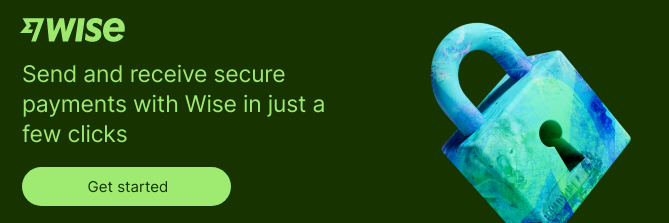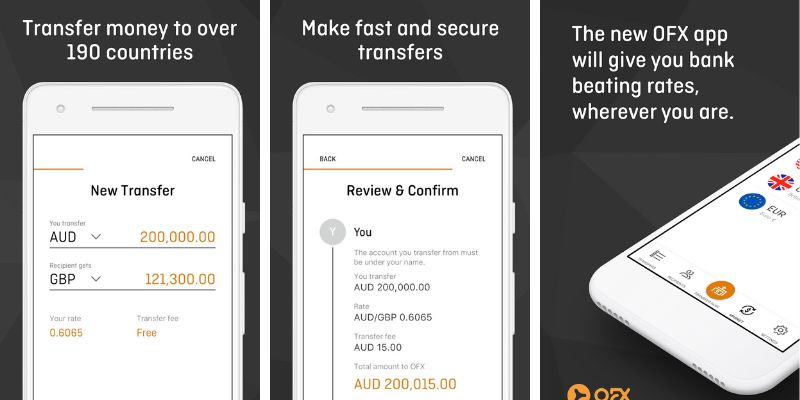How to send international wire transfers over $10,000: Full guide [2025]
You can easily send high value payments both locally and internationally, through your bank or with a third party provider. But what’s required in terms of foreign wire transfer IRS reporting? What’s the international money transfer limit for the IRS and who is responsible for submitting a payment report?
This guide has all you need to know, looking at the requirements for IRS reporting for payments of over 10,000 USD, and some providers you may like to use for your next payment.
Table of Contents
- Key points: Sending wire transfers internationally over $10,000
- Do wire transfers over $10,000 get reported to the IRS?
- So, what happens if you wire transfer more than $10,000?
- How to send money internationally over $10,000
- Best ways to send large amounts of money oversea
- OFX
- Xe Money transfer
- Remitly
- CurrencyFair
- Can I transfer more than $10,000 between my own accounts?
- How much money can you legally wire internationally?
- Can you deposit more than $10,000 to the bank?
- Key takeaways & FAQs
Key points: Sending wire transfers internationally over $10,000
- You can send payments to and from the US with your bank or by using a specialist provider like Wise or OFX
- Payments of over 10,000 USD are reported by the bank or money transfer service to FinCEN which is tasked with preventing financial crime
- Individuals do not need to take action to report electronic payments to FinCEN or the IRS in most cases, this is handled by the banks processing the payment
- Specialist services like Wise can offer good exchange rates and fee discounts if you’re sending a high value payment
Do wire transfers over $10,000 get reported to the IRS?
As part of the Bank Secrecy Act, US banks and financial institutions have to report wire transfers of 10,000 USD or more to FinCEN, the Financial Crimes Enforcement Network.
The same applies if the daily total amount an individual sends is in excess of 10,000 dollars spread across more than one payment.
This reporting requirement is designed to prevent money laundering or other financial crimes such as tax evasion.
This may mean that your bank passes on information about high value payments to FinCEN which can notify the IRS if there is any suspicion of criminal activity.
Do I need to report my large wire transfer to the IRS?
No. Generally you do not need to take any action to report your payment.
The bank you use, or the money transfer service, will complete the reporting on your behalf.
So, what happens if you wire transfer more than $10,000?
If you make a high value wire payment your bank or money transfer service will usually pass details of the payment to FinCEN. FinCEN is tasked with detecting and preventing financial crime and so large payments, or patterns of payments which add up to large values, are checked for signs of suspicious activity.
When you send a large payment, the bank or provider you use may be obliged to get some extra paperwork from you, showing where the money has come from. This step is used to prevent financial crime, and to make sure illegally obtained funds can’t be transferred. Your bank will let you know what’s needed based on the circumstances of your specific payment.
Whether or not there’s any further duty related to the payment will depend on the nature of the transfer. For example, if you’re sending a large value payment to someone as a gift, you or the recipient may need to look at whether or not gift tax applies. If someone sends you a high value payment to the US which is for goods or services, you may owe income or business tax. Because tax can be a complicated area, you’ll need to talk to an accountant to understand if you have any further obligations to the IRS or any other agency, if you’re unsure.
Bear in mind also that when sending or receiving an international payment, the other country or countries involved may also have laws and regulations which impact your payment.
How to send money internationally over $10,000
You can send money internationally with a bank or with a specialist third party service. Using a specialist usually means you can get everything set up conveniently online or through an app, with low fees and strong exchange rates.
The exact process you follow can vary, but usually the steps will be fairly similar:
- Sign up for an account with your preferred provider
- Complete the verification step by uploading an image of your ID
- After verification, enter the payment details
- Upload any additional documents depending on the payment details
- Fund the payment from your bank, and the money will be deposited in your recipient’s account
Best ways to send large amounts of money overseas
We’ll take a look at some providers you may want to pick for your next high value international wire payment, next.
Firstly let’s look at some options side by side for comparison:
| Provider | Fees | Exchange rates | Limits | Speed | Safety |
|---|---|---|---|---|---|
| Wise | From 0.57% | Mid-market rate | Variable – usually around 1 million GBP | 60% of payments are instant, 90% arrive in 24 hours* | 2 factor authentication, in-app tracking |
| OFX | No transfer fee | Exchange rate is likely to include a markup | No limits | 1 – 2 days | Secure app, 24/7 phone support |
| XE | Variable fees based on payment details | Exchange rate is likely to include a markup | 535,000 USD | Variable delivery times based on payment details | Industry level security from a huge global provider |
| Remitly | Variable fees based on payment details | Exchange rate is likely to include a markup | 25,000 USD (30,000 USD to India) | Variable delivery times based on payment details | Secure app, anti fraud tools |
| Currencyfair | 3 EUR or equivalent | Exchange rate is likely to include a markup | Not specified | Variable delivery times based on payment details | AWS hosted, thorough verification processes |
*The speed of transaction claims depends on individual circumstances and may not be available for all transactions
**Details correct at time of research – 25th February 2025. About Wise pricing/fees: Please see Terms of Use for your region or visit Wise Fees & Pricing for the most up to date pricing and fee information
Wise
Wise offers payments to 160+ countries, which you can arrange online and in the Wise app. Currency exchange uses the mid-market exchange rate with no fee added, and a small, transparent transfer fee which starts from 0.57%.
Fees are discounted if you send high value transfers, or send cumulative payments which add up to more than the equivalent of 20,000 GBP in a month. Transfers are processed quickly and securely, and you’ll be able to track your payment by logging into the Wise app.
You can also open a Wise account to send and receive international payments in a broad range of currencies. Accounts come with local and SWIFT account details so you can be paid by others in global currencies and without needing to convert back to USD if you don’t want to.
Wise: Best features
- Wise has automatic fee discounts for transfers which are equivalent to 20,000 GBP or more
- Get help from a dedicated customer support teams for large amount transfers
- High limits, around 1 million GBP per payment
More information on – Wise large amount transfers
What is the international transfer limit for Wise?
Wise limits: In US licensed states, Guam and the Virgin Islands, you can send up to 1 million USD per transfer – some other limits may apply to some accounts.
Check your account terms and conditions to understand the specific limits, or reach out to Wise customer service for help. Wise has a dedicated support team for large transfers, you can contact them here.
Does Wise report to tax authorities?
Wise is registered in the US and implements local and international law regarding reporting payments. In the US Wise is regulated in certain states, and in other states works through a partner financial institution – the Community Federal Savings Bank, which is supervised by the Office of the Comptroller of Currency. Wise is also registered with FinCEN.

OFX
OFX is a specialist in international payments and currency conversion, which offers international transfers with no upfront transfer fee.
There’s also no limit to the amount you can send with OFX – if your bank has a limit you can send in partial payments to fund your transfer in stages. OFX exchange rates are likely to include a small fee.
You can arrange your payment online or in the OFX app, but the service the brand is best known for is offered by OFX brokers, who you can talk to on the phone 24/7.
If you’re a business customer you can also open a Global Currency Account which lets you receive payments from others in a selection of foreign currencies conveniently and with no OFX fee.
OFX: Best features
- 24/7 phone service if you need to discuss your options
- No transfer fee for payments from the US
- Unlimited payment options
What is the international transfer limit for OFX?
There is no set limit on the amount you can send overseas with OFX. If you need to send a very high value payment you might be asked to arrange it over the phone so a member of the team can help talk you through your options.
Does OFX report to tax authorities?
OFX is a large global business and complies with all legal requirements to report payments and check customer documents.

Xe Money transfer
Xe Money Transfer supports payments from the US to 130+ countries, with variable fees and exchange rates depending on where you’re sending to.
The Xe limit from the US is set at 535,000 USD.
You can arrange your payments online or in the Xe app, for deposit to bank accounts and mobile money accounts globally.
Xe Money transfer best features
- Large global organisation with excellent currency options
- Some transfers have no fee – this depends on the payment details
- High per payment limits
What is the international transfer limit for Xe Money transfer?
From the US, the Xe transfer limit is 535,000 USD per payment.
Does Xe Money transfer report to tax authorities?
Xe is a large global organisation which is bound by legislation in the US and in other countries it operates in. To maintain its license and continue offering services, Xe will comply with all the reporting rules which apply.
Remitly
Remitly offers international payments with a variety of payout methods, including bank account, mobile wallet, or for cash pickup, on popular remittance routes.
Remitly has fairly low limits for payments from the US, to protect customers and ensure account security. The service is intended for people sending money to loved ones, and so this is not the right pick for a very high value transfer.
However, the range of pay out methods can make it appealing if you need to get a fairly large amount of money to someone quickly, in particular to a mobile wallet or as cash.
Remitly best features
- Excellent range of payout methods
- Variable fees depending on the destination you send to
- Easy to use app and online service
What is the international transfer limit for Remitly?
Remitly limits: With Remitly you can send 25,000 USD per payment, or 30,000 USD to India.
Does Remitly report to tax authorities?
Remitly acts in accordance with international regulations and will report payments to the authorities as required by law.
CurrencyFair
Currencyfair uses a flat rate for transfers, which is set at the equivalent of 3 euros. That can make this a popular choice for higher value transfers as in relative terms the fee is pretty small. There’s also a small fee added to the exchange rate used to convert your dollars to the currency needed for deposit, which does push up the costs a bit more.
You can create your payment online or in the Currencyfair app, to be securely deposited to your recipient’s bank account.
CurrencyFair best features
- Low, flat transfer fee of 3 euros
- Send to a very large range of countries globally
- Good exchange rates
What is the international transfer limit for CurrencyFair?
CurrencyFair does not specify a transfer limit. If a payment you’re making hits a limit you will be notified in the app.
Does CurrencyFair report to tax authorities?
CurrencyFair is bound by laws in the US and in the other countries it operates in, and will report payments and transactions as needed by law.
Can I transfer more than $10,000 between my own accounts?
You can move money between accounts in your own name, subject to your own bank or money transfer provider’s limits. If you’re unsure about whether a payment would be reported to FinCEN or any other authorities you may want to talk to your bank before you initiate it.
Generally, your bank’s obligation to report will be based on any concerns about illegal or unusual activity, and so whether or not any action is required by them may depend on your banking history and other factors.
How much money can you legally wire internationally?
There’s not a legal limit on the amount of money you can wire, but there are some practical issues to consider. Individual banks have their own limits which are often set for security reasons, so if you’re sending a very high value transfer internationally you will need to check the rules which apply to your preferred account or provider.
More information – International money transfer regulations
Can you deposit more than $10,000 to the bank?
Banks generally do not limit the amount you can deposit to an account, although cash deposits may have fees associated. High value transactions to a bank may be subject to reporting requirements, which apply when depositing cash as well as electronic methods of payment.
Another common question: Does the Bank Secrecy Act apply when you are just opening a new bank account with a deposit of your own money?
The Bank Secrecy Act applies to deposit of cash as well as to electronic transfers, and so your bank may still report an incoming deposit to a new account if you move over 10,000 USD within a 24 hour period.
Key takeaways: Sending money internationally over $10,000
Sending a high value payment may feel a little risky but as long as you use a reputable bak or specialist provider, the transfer should be safe.
In the US, banks and money transfer providers have to record and report payments of 10,000 USD or more, in particular if there is any pattern of suspicious activity. This is a requirement of the Bank Secrecy Act.
As a customer you do not usually need to take any action – the provider will handle the process for you instead.
- You can send payments to and from the US with your bank or by using a specialist provider like Wise or OFX
- Payments of over 10,000 USD – or an aggregate amount of 10,000 USD sent in a 24 hour period – are reported by the bank or money transfer service to FinCEN
- FinCEN is tasked with preventing financial crime and will look out for suspicious activities and patterns in payments
- Your own bank or provider may have payment limits which can be relatively low for digital transfers
- Specialist services like Wise can offer good exchange rates and fee discounts if you’re sending a high value payment
FAQs
Does the Bank Secrecy Act look at transfers between your own accounts?
The Bank Secrecy Act is designed to detect suspicious activity in financial accounts. Moving money between your own accounts is not likely to be considered suspicious, but banks and providers may still be obliged to record and if they deem necessary, report payments of over 10,000 USD.
Do I have to pay tax on money transferred from overseas to the USA?
Whether or not you need to pay tax on an international payment coming into the US will depend on the reason for the payment among other factors. Because tax can be a complicated area, you’ll need to talk to an accountant to understand if you have any further obligations to the IRS or any other agency, if you’re unsure.
What happens if I transfer $10,000?
When you transfer 10,000 USD or more, the bank or provider you use will have to keep a record of the payment. In some cases the transfer will also be reported to FinCEN, which is the financial crime prevention agency, for checking.

